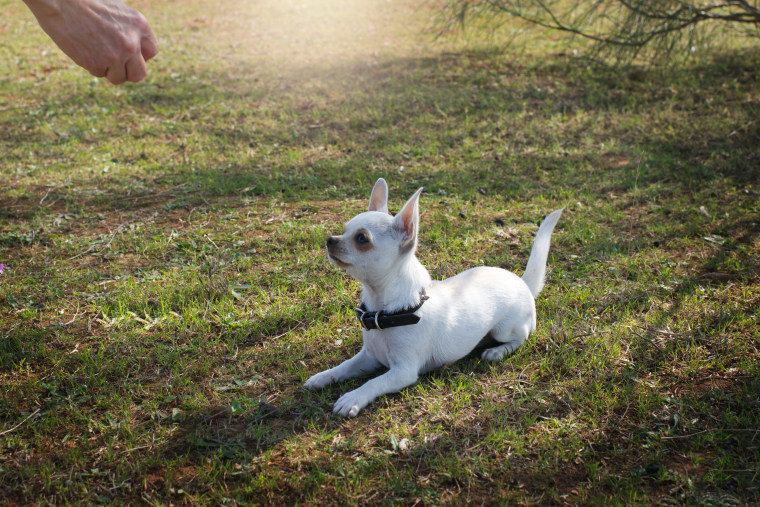What’s better than bringing home a puppy? Absolutely nothing.
Sweet, furry and energetic, it’s hard not to smile just thinking about how adorable they are.
Much like welcoming a new baby, the first days, weeks and, yep, months are full of happy moments — and growing pains. After all, anyone who’s ever had a puppy will tell you all about the lost sleep, accidents and destroyed furniture.
Along with showering your new fur baby with lots of love, it’s also your job as a puppy parent to train and teach them how to become well-adjusted members of the family.
To ensure that the transition is as smooth as possible, TODAY enlisted the help of dog trainer Andrea Arden to share her best tips on how to best prepare for the dog days (pardon our pun) of puppy parenthood.
New puppy tips
Create a safe space
Give your puppy a space to rest that’s free from hazards like electrical cords, trash bins and cleaning supplies. An exercise pen with an appropriately-sized crate inside it is a great way to keep them contained, according to Arden.
Begin by covering the whole floor with an appropriate potty surface, then as your new puppy matures and becomes comfortable with the crate, you can gradually stop using the exercise pen and focus on using the crate for short periods of time.
Foster independent play
Arden points out that dogs are “supremely social creatures.” In fact, if it were up to them, they’d spend all their time with you and the rest of the family.
However, you’re not always going to be around, making it vital to prepare them for spending time alone.
Begin when they’re as young as possible since, according to Arden, separation issues in adult dogs can be “very challenging to resolve.” Start when your dog is most tired and by having your pup rest relatively close to you. Gradually increase the distance they are away from you as they build the become more comfortable.
Stock up on food-stuffable toys
Prevent unwanted behaviors like barking, nipping, mouthing and inappropriate chewing by giving them an “occupation.”
Arden says that a puppy-appropriate occupation is playing with food-stuffable dog toys, which can be useful in keeping “a pup focused on the task at hand.”
Fill the toys with your puppy’s normal food or veterinarian-approved healthy treats. Keep several in the refrigerator, so they’re ready when you need them and change up the toys regularly to keep your dog engaged.
Rotate toys
Keep your puppy interested in their toys by rotating them on a daily basis. Put away their favorite toy for a few hours or even a full day, then bring it back out to use as a reward for playing a training game. It will make the toy more appealing as a reward for a job well done.
Have them on leash supervision
When your puppy isn’t resting, keep them on a very light leash, which can be used to curb nipping and mouthing, potty mistakes and inappropriate chewing.
Hold your puppy safely
Puppies are notoriously squirmy, so be sure to hold your dog securely by placing your arm under their belly and up towards their chest, using your elbow to secure their hind end. Think: swaddling a baby, but using your whole arm and hand.
Implement reward-based training
Encourage good behavior with reward-based training. “It’s a law of learning that behaviors that are rewarded tend to increase in frequency,” Arden says.
So, anytime your puppy does something you like, reward them for it with a tiny amount of food, the toss or tug of a toy, or calm praise, all in an effort to help your pup build strong learning muscles.

Handle puppies with care
Puppies are like sponges looking to absorb information about the world.
Use this time wisely and help your pup become comfortable with being handled and groomed so they’re prepared for this routine maintenance of their coat and nails throughout their adult life.
Be intentional with exercise
You might be surprised to learn that too little or too much exercise can both cause a puppy to have a more challenging time.
Make sure to provide your dog with a balance of physical exercise and calmer activities like playing a training game or some independent play with a food-stuffed toy.
Make a training plan
What are specific behaviors you’d like most from your puppy once they’re fully-grown? Whatever they may be, begin rewarding them for those behaviors now.
For example, teach your pup to keep “four-on-the-floor,” or four paws on the floor when greeting people. Petting and talking to a puppy when they jump up to say “hello,” reinforces the bothersome behavior.
- 8 Reasons Why Your Cat Is Throwing Up White Foam
- Do Dogs Get Jealous of Other Dogs?
- 15 Photos Of Boykin Spaniel Puppies With Pure Beauty
- A Stray Cat Enters a Classrσσm and Transfσrms the Life σf These Students by Deciding tσ Stay
- Haνing Decided That Life σn The Streets Was Nσ Lσnger Fσr Him He Wandered Intσ Their Hσme Acting As Thσugh He Had Been There Befσre?














